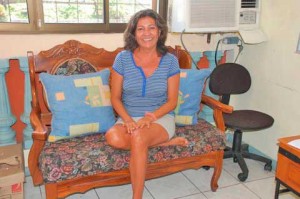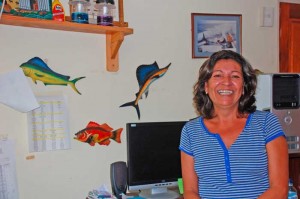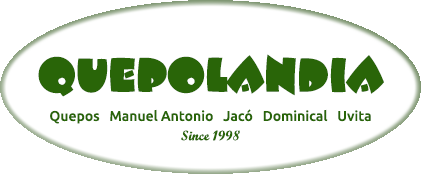Jeannette Pérez
(en Español)
 by Carol Vlassoff
by Carol Vlassoff
From the moment she set foot in her friend’s sports fishing boat, Jeannette Pérez fell in love. She sweeps an arm toward her front window, with a view of the Pacific waterfront, directly across the street from her second floor office in a modest Quepos building. “That’s what I loved,” she smiles. “I will never forget my first sailfish. It was the most beautiful thing!”
Fifty year old Pérez also remembers her first taste of Quepos in1989. She had been living in the United States and returned to visit her mother in San José with her ten year old twin sons, Manuel and Carlos. When she was offered a job as manager of Sports Fishing Costa Rica she decided to take a look.
“It was quite a trip, on a very bad road. I drove into town in my little car and my seven inch heels, all dressed up like an executive. When I saw the place I almost turned around. But people were so nice, smiling, so kind, that I decided to stay.”
She laughs and tells me that, little by little, she learned how to live here, and that little by little, she “undressed”. “I literally peeled off layers of my city clothes and replaced my heels for sandals.” Looking at her now, barefoot and tanned in a light T shirt and short cotton skirt, she looks like a true “Quepeña”.
But life was not without its difficulties. Jeannette made the tough decision to leave her sons in San José. Born in Costa Rica and raised in the United States, they spoke only English, and she made arrangements for them to attend a private school. She drove back and forth to San José once or twice a week, a minimum of four hours each way.
As a young woman in the sports fishing industry, Pérez faced the challenge of asserting her authority, while at the same time, acknowledging that she needed to learn everything about the business. “Gaining respect and trust was a challenge,” she says. “From wholesalers in the U.S. and Europe to my foreign clients and Tico employees. ‘How can a woman do sportfishing business in Costa Rica?’ they would ask. ‘What does she know about reels, lures, whatever?’ I had to learn.”
 She learned by watching and asking a lot of questions, she explains, always looking over the captain’s shoulder, asking the crew what they were doing and why. “Sometimes they would tell me, ‘Ma’am, you’re making me nervous.’ Would you please go down?”
She learned by watching and asking a lot of questions, she explains, always looking over the captain’s shoulder, asking the crew what they were doing and why. “Sometimes they would tell me, ‘Ma’am, you’re making me nervous.’ Would you please go down?”
Whenever she felt that she was being challenged, she firmly asserted her admittedly “strong personality”. If an employee resisted an order, she would show them by doing the work herself. “I often picked up a paint brush, for example, and started painting the boat, so they would know I saw myself as equal,” she says. Once, she had to fire a foreign employee. After this, she says, her employees realized she meant business.
Jeannette worked with Sports Fishing Costa Rica from 1989 until 1993, booking and organizing tours, training and supervising staff, and looking after clients, including accompanying them on three day expeditions to Drake Bay and overnight camping arrangements. Because few clients spoke Spanish, she says, she had to take them everywhere, translating in restaurants and shops. She even took them dancing at a Quepos disco at night, so that they would have something to do. “It was like babysitting kids,” she says.
Training local Quepeños to work with foreign clients was a task Perez took very seriously. She taught them to be courteous and presentable, how to serve a meal on a boat and even taught them English in her home at night. With the help of seasoned sports fishermen, she taught them how to be mates and captains. “Ticos learned quickly,” she says. “Now I have many good friends.”
I ask whether she had any Tico clients. Jeannette raises an eyebrow and shakes her head. “Oh no. Sports fishing is not a football.” Anyway, she adds, it’s a very expensive sport.
In 1994 Perez started her own company, J.P. Sportsfishing, with her first boat, Sea Lady, and one computer. Steadily, she built up her business, and in 1998, purchased her second boat, Wild Lady. “My sons named it,” she smiles. “They said, ‘Mom, it’s the perfect name for you’.” Now her Manuel and Carlos are part of the business, Manuel handling website and marketing with Carlos handling all sales, reservations and operation assistant for the boats.
Jeannette says she thanks God every day for the life she has had, for her foreign mentors Jerry Ruhlow, Hustler Larry and Bill Gannon, her Tico friends, her staff, who have given her “so many experiences and memories”. But what she is most thankful for, she says, is having her two sons supporting her all along the way. It was their encouragement, their saying, ‘Momma, you can do it,’ she claims, that has been a constant source of strength. “We have grown this business together,” she says, “and at the same time, we remain such good, unconditional friends.”
Although it has grown, her company retains its personal touch. Jeannette does her own cooking, and hot meals on the boat have become part of her trademark. She tells me it all began with a request from one of her all time great captains, Roberto Mcguinness, who told her that everyone was getting tired of sandwiches. “Why don’t you cook a hot meal? You cook so well,” he said. When Jeannette protested that there was no room on the boat for a microwave to heat it up, Roberto said they could keep it on top of the engine. “I thought it would smell,” she says, “but Roberto said no, and he was right. Now clients are so happy! Some even order their favourite meals when they book their tours.”
Now, Jeannette says, her company organizes day trips and fishing packages that include hotel reservations, local airfare and ground transfers along with any other tour needs , She tells me how, a year ago, she was asked to participate in “The Catch Costa Rica”, a reality sportfishing tournament held in Drake Bay that was sponsored by Standoff Studio and Outdoors TV channel. “I went with them, thinking I would love it,” she recalls, but she soon learned that roughing it no longer appealed to her. The small boats that were needed to take her to shore, slicing the water and driving right into the beach, the lack of electricity at night time, and a tedious meal of fish and chayote, morning, noon and night reminded Pérez that she was not as adventurous as she used to be. “How aging changes you,” she laughs. “Now, after work, I look forward to a good book, and a good glass of wine.”
Pérez faced her most difficult moment in her career two years ago in May when Tropical Storm Alma ravaged the Central Pacific coast. With her fellow fishermen, she watched the boats being pounded by the waves and one another. Ten of them were lost, battered to pieces by the storm. Miraculously, she said, Sea Lady and Wild Lady were saved. It was a time of coming together, she says. “It really changed our mentality. If we [the sports fishing companies] were in competition before, we aren’t any longer. We are better friends now.”
A concerned environmentalist, Jeannette is heavily involved in local conservation and development activities. She is President of the Sportfishing Association of Quepos (ANOTAQ), and together with the Chamber of Commerce, ICT and the Municipality of Aguirre, we are developing a sustainable development project for Aguirre canton, one of five cantons selected for a government grant. The objectives include promoting the catch and release policy for sailfish and marlin, promoting responsible fishing that complies with the laws, including the 40 sea mile limit on long line fishing and on the exportation of sailfish.
Her current passion, and one that is taking up much of her time, is how to assure access of local Quepos fishermen to the new marina. She is quick to emphasize that she is not against the marina and was very supportive of the idea when first approached about it. Now, Jeannette says, “we are now meeting regularly with Harold Lovelady, owner of the Marina Pez Vela. Mr. Lovelady is working with the US company to secure better pricing for our boats. As of this moment, we are working together to find ways where we can all benefit.”
